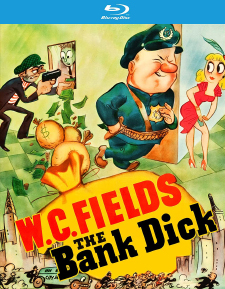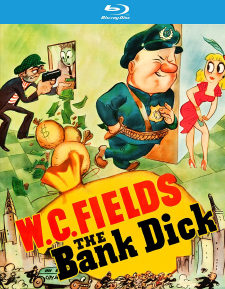Bank Dick, The (Blu-ray Review)

Director
Edward F. Cline/Ralph CederRelease Date(s)
1940 (November 9, 2021)Studio(s)
Universal Pictures (Kino Lorber Studio Classics)- Film/Program Grade: A+
- Video Grade: B-
- Audio Grade: B
- Extras Grade: B
Review
The Bank Dick may or may not be the greatest film that W.C. Fields ever made, depending on your point of view, but it’s unquestionably one of his most beloved works. Part of that is due to the film’s remarkable efficiency; it runs a lean 72 minutes long, with no filler. It’s just one classic bit after another, and the minimal exposition in the film is always undercut with hilarious gags—if any dialogue is threatening to slow things down, Fields is always doing some physical comedy nearby to distract from it. But the other reason why The Bank Dick is so popular may be that it features Fields at his most unadulterated, in more ways that one. Unlike his other films for Universal, this time he wasn’t paired with another comedian like Edgar Bergen or Mae West, so he remains front and center for the entire picture. Perhaps more importantly, the character that he played here remains blissfully free of any redeeming qualities whatsoever. His circumstances may change, but Egbert Souse remains the same person at the end of the film that he was at the beginning. The lack of a character arc would be an issue for many actors, but for Fields, it was a feature rather than a bug—Souse at his worst was Fields at his best.
The Bank Dick was directed by veteran comedy director Edward F. Cline, with a screenplay by Fields, and uncredited dialogue work by Richard Carroll. Fields wrote this one under the pseudonym “Mahatma Kane Jeeves,” which was a punning setup for something which happens at the end of the film—a reward for those who were paying attention all the way through. Egbert Souse (Fields) is a drunken, jobless, good-for-nothing who is happy to steal from his youngest daughter’s piggy bank to pay for trips to the bar. A series of misadventures leads him to become the security guard at the bank where his eldest daughter’s fiance Ogg Oggilby (Grady Sutton) happens to work. Needless to say, his misadventures will only become more misadventurous before everything is resolved, more or less happily. The Bank Dick also stars Una Merkel, Franklin Pangborn, and none other than Shemp Howard.
The most fascinating thing about Fields was how audiences could sympathize with his characters no matter how unsympathetic or irredeemable that they may have been. Some of that is because of his natural charisma, but it’s also thanks to the canny way that he wrote the characters who surrounded him. In the case of The Bank Dick, no one feels any more sympathetic than Egbert Souse, and everyone gets what they deserve. Even those who are arguably victimized by his schemes never really feel like victims—there are no saints here, only sinners. Souse’s own family are hardly innocents; in fact, it’s significant that they talk about how much he has changed at the end of the film, when he hasn’t actually changed in the slightest. The only difference is that they now have money, and their perceptions of him are solely based on how poor or wealthy they are. All of their henpecking has had nothing do with his lack of character, but rather his lack of funds. When Souse once again follows the siren call of Shemp Howard’s bartender in the closing shot of the film, no one would ever blame him for doing so.
Cinematographer Milton R. Krasner shot The Bank Dick on 35 mm film using spherical lenses, framed at the 1.37:1 aspect ratio for its theatrical release. There’s no information regarding the transfer that Kino Lorber used for this Blu-ray release, but it appears to be an older master taken from dupe elements. The grain structure is much heavier, with the grain being coarse enough that it can occasionally obscure some of the detail. There’s damage like small scratches and speckles throughout, though most of it appears on a frame-by-frame basis, rather than running through multiple frames—it’s more noticeable when freeze-framed than it is in motion. There are only a few more prominent scratches which stand out, such as toward the end of the film as Souse leaves his new mansion. On the other hand, the grayscale is excellent, with good contrast and black levels, though the nature of the elements used means that the shadow detail can get lost at times—for example, the black suit worn by Souse at the beginning of the film sometimes turns completely black. Despite these minor flaws, this is still a fine upgrade over previous SD versions of the film. Better to have a few blemishes than to have all the texture scrubbed clean via Digital Noise Reduction.
Audio is offered in English 2.0 mono DTS-HD Master Audio, with optional English subtitles. There may be just a bit more background noise than some other titles of this vintage, but it’s otherwise clean, with clear dialogue.
The following extras are included:
- Audio Commentary by Michael Schlesinger
- Trailer (SD – 1:54)
- The Old Fashioned Way Trailer (SD – 2:37)
- You Can't Cheat an Honest Man Trailer (HD – 1:37)
- My Little Chickadee Trailer (SD – 1:36)
- Road to Zanzibar Trailer (SD – 2:16)
Filmmaker and historian Michael Schlesinger kicks off his commentary by noting where The Bank Dick fits into Fields’ career at Universal, and also giving director Edward F. Cline fair due as one of the unsung geniuses of cinematic comedy. He then launches into voluminous detail about the filmographies of nearly every single cast member, including many of the bit players who only appear in a shot or two. (For instance, he explains that Dick Purcell, who has a small part as a producer of a film within the film, happened to be the first actor to play Captain America on screen.) As always, if you want to know just who played what part in a film, even the uncredited ones, Schlesinger is your man—just don’t challenge him to a game of Trivial Pursuit. He also explains some of the topical references and jokes that may not work as well for modern audiences, and even notes the origins for some of the stock music used in the film. Of course, he spends plenty of time discussing The Great Man himself, who he accurately describes as being the only actor who could hit children in a film like this and get away with it. Schlesinger closes everything by reading from some of the original reviews for The Bank Dick. (All that, and he still manages to find time to squeeze in at least one reference to It’s a Mad, Mad, Mad, Mad World.)
The Bank Dick is a delight from the opening frame to the last, with W.C. Fields at the height of his powers, surrounded by a supporting cast who actually supported him, rather than distracting from him. The trouble with outsized comic actors like Fields is that no film was ever big enough for two of them, as the problematic My Little Chickadee proved. Here, everyone was working toward the same goal of keeping the Fields brand of comedy on brand, and the results speak for themselves.
- Stephen Bjork
(You can follow Stephen on Facebook at this link)

